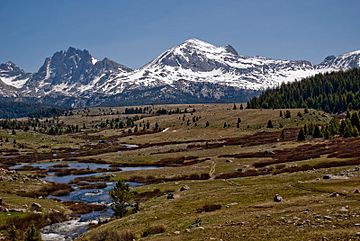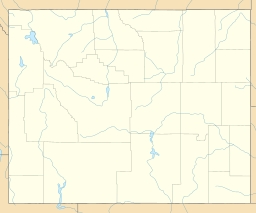Raid Peak facts for kids
Quick facts for kids Raid Peak |
|
|---|---|

Viewed from Bonneville Basin, Raid Peak is at center and jagged Mount Bonneville is at left.
|
|
| Highest point | |
| Elevation | 12,537 ft (3,821 m) |
| Prominence | 852 ft (260 m) |
| Geography | |
| Location | Sublette County, Wyoming, U.S. |
| Parent range | Wind River Range |
| Topo map | USGS Mount Bonneville |
| Climbing | |
| Easiest route | Scramble, but east face class 5.8 |
Raid Peak is a tall mountain in Wyoming, a state in the United States. It stands about 12,537 feet (3,821 meters) high. You can find this mountain in the Wind River Range, which is a big group of mountains.
Raid Peak is part of the Bridger Wilderness area within the Bridger-Teton National Forest. It is located about 1.25 miles (2 kilometers) west of the Continental Divide. The Continental Divide is like a big line across North America. It separates rivers that flow to the Atlantic Ocean from those that flow to the Pacific Ocean. Raid Peak is also about 0.85 miles (1.4 kilometers) south of Mount Bonneville.
The east side of Raid Peak has a very impressive cliff. This cliff rises almost 2,000 feet (610 meters) above a lake that doesn't have a name. About 1,700 feet (518 meters) of this cliff is a nearly straight wall. Climbing this wall is very challenging and is rated as a class 5.8 climb. Most people who try to climb this part of the mountain need at least one or two days to reach the top.
Staying Safe in the Mountains
When you explore places like the Wind River Range, it's important to be prepared and stay safe. The mountains are beautiful, but they can also be challenging.
Common Mountain Challenges
- Wildlife: You might see bears or other animals. It's important to know how to act around them.
- Weather: The weather can change very quickly. You might experience snow, even in summer, or very cold temperatures at night.
- Bugs: Sometimes there are many insects, like mosquitoes.
- Wildfires: Forest fires can happen, especially in dry seasons.
Being Careful on Trails
Hiking and climbing in the mountains can be risky. Trails can be steep, and rocks might be loose. It's always important to watch your step, especially on rocky paths. Falling rocks can also be a danger. Always go with experienced people and tell someone where you are going.
If someone gets hurt in the mountains, special teams like search and rescue groups help them. These teams are trained to find and help people in difficult areas.



